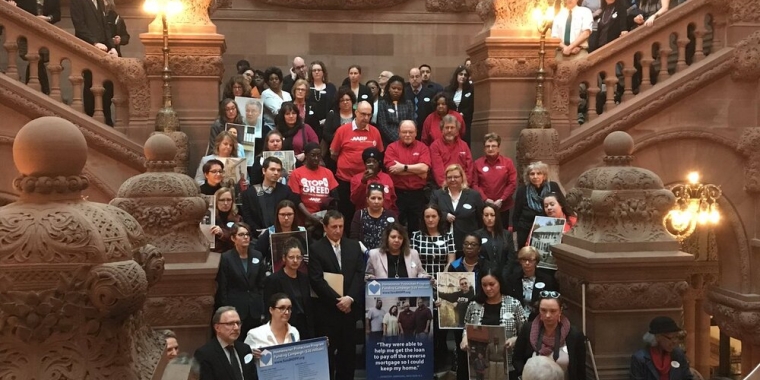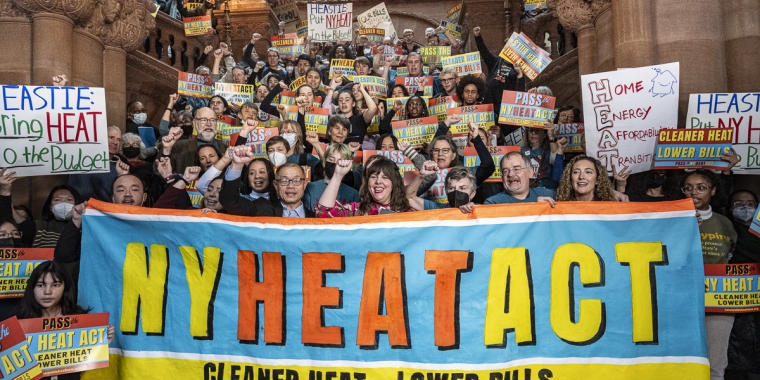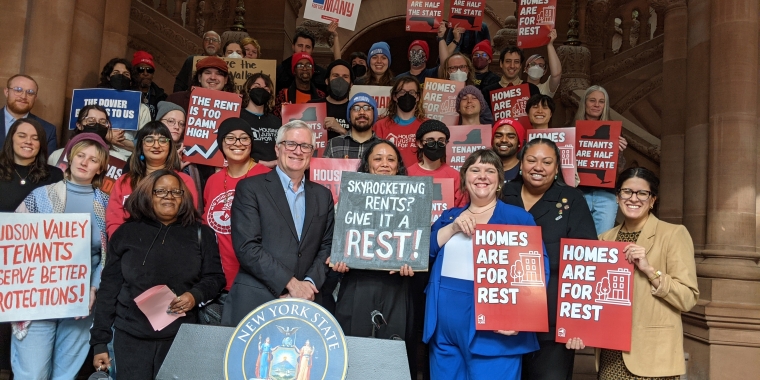In ‘Year Of Housing,’ Hochul’s Budget Leaves Out Anti-Foreclosure Program

The governor’s proposed budget did not include funding for the state-run Homeowner Protection Program, or HOPP, a network of legal service providers and counselors aimed at preventing foreclosures. Program supporters say the omission ‘makes no sense’ as New York grapples with a housing crisis, which Hochul’s administration has centered as a policy focus this year.
Last year, Gov. Kathy Hochul bucked a trend.
Prior to 2022, Senate Housing Committee Chair Brian Kavanagh recalls a “game of chicken” over funding the state-run Homeowner Protection Program, or HOPP, a network of legal service providers and counselors aimed at preventing foreclosures.
But unlike her predecessor Andrew Cuomo, Hochul came out of the gate with $20 million for HOPP in her inaugural budget proposal, on par with historical funding levels. Last year’s final budget ultimately sent $35 million for the program.
“That was a first and it was a welcome change,” said Jacob Inwald, director of foreclosure prevention at Legal Services NYC, a HOPP recipient. The additional funding allowed organizations to increase their staffing at a time when hundreds of thousands of households across the state were behind on mortgage payments. HOPP called for $40 million this year to keep up with increased need precipitated by the coronavirus pandemic.
So Inwald and his colleagues, as well as program supporters in the Legislature, were disappointed to find HOPP funding absent from the fine print of Hochul’s $227 billion proposed budget released in February. Some pointed out that the governor has made increasing the state’s housing supply a major policy plank this year.
“It makes no sense if this is the year of housing,” said Linda B. Rosenthal, chair of the Assembly Housing Committee, who urged Hochul to add HOPP funding to her budget proposal within a one-month amendment window closing Friday.
But asked about the issue at a housing-focused budget hearing Wednesday, Homes and Community Renewal Commissioner RuthAnne Visnauskas said she was under the impression that HOPP still had some unspent funds from last year.
“Last year the funding was almost doubled—we have not heard that that funding is fully expended,” she said.
HOPP is administered by the New York Attorney General’s Office, and the grant period, which runs until mid-July, is a little more than halfway finished. About $34.3 million of last year’s funds have been committed, according to the office. It was not immediately clear how much had been spent. The office did not provide a comment to City Limits.
In an emailed statement, Hochul spokesperson Justin Henry said that the proposed budget “makes transformative investments to make New York more affordable, more livable and safer” and that the governor “looks forward to working with the legislature on a final budget that meets the needs of all New Yorkers.”
The governor’s office also pointed to $50 million she has proposed to fund home repairs in 10 areas of the state with high concentrations of low-income homeowners of color, pitched as the Homeowner Stabilization Fund.
A separate Homeowner Assistance Fund, or HAF, launched in January 2022 with $450 million in federal dollars from the American Rescue Plan. Funds can be used to pay property taxes, water bills, mortgage delinquencies and coop and condo fees.
This is all welcome, said Kirsten E. Keefe, senior staff attorney with the consumer finance and housing unit at the Empire Justice Center in Albany. But it’s HOPP housing counselors who typically help people access these types of funds.
“These [HOPP] agencies, and primarily the housing counseling agencies, are the ones who meet with homeowners and help them apply,” said Keefe, one of HOPP’s anchor members responsible for training and data collection.
Iona Jarmond, 64, of Graniteville on Staten Island, described to City Limits how difficult it would have been to fend off foreclosure on her family’s townhouse without help from Staten Island Legal Services attorney Jennifer Lerman, by way of HOPP.
“There’s no way I could have done this without Jennifer. It was so much paperwork. A lot of this stuff is online,” Jarmond said. She had no fallback locally, she continued: “I would have to go live with my daughter in Maryland, probably.”
HOPP’s predecessor launched in 2008 with $25 million from the state. State funds kept it afloat through 2011.
The Attorney General’s Office stepped in to create HOPP as it’s currently known in 2012. It was initially funded by the National Mortgage Settlement, precipitated by the financial crisis, and by subsequent bank settlements. Yet some level of state funding has been in play since 2015, according to Keefe of Empire Justice Center.
Today, HOPP has 89 member organizations—including more than 25 in New York City—and, according to the Attorney General’s Office, has served close to 150,000 families. A HOPP member survey conducted before the pandemic found that 43 percent of the program’s clients statewide were homeowners of color. The figure within New York City was higher—75 percent.
Existing HOPP contracts run until July 15, at which time any unused funds must be returned to the Attorney General for possible reappropriation. Homeowners often exceed the income limits attached to general legal services funding, whereas HOPP members can set their own guidance for participant eligibility, such as primary residence requirements.
Without sufficient funding, providers say they’d likely be forced to reduce services. They also predicted layoffs.
Robert McCool is director of homeownership services at the Fifth Avenue Committee in Gowanus. His clients live in neighborhoods including East Flatbush, Flatlands and Canarsie, he said. His team helps outside of court, navigating loan modification and mortgage refinance options, as well as property and water tax reduction programs.
“I don’t think we’d have funding to support a dedicated foreclosure prevention counselor,” he said. “It would be really on my shoulders and I have limited capacity to counsel and manage the program.”
Meanwhile, mortgage distress appears to be on the rise following pandemic-era deferral initiatives and a statewide foreclosure moratorium that was lifted at the start of last year.
Shy of 1 percent of New York mortgages were in early-stage delinquency in June 2022, according to a December analysis by the U.S. Consumer Financial Protection Bureau, up from 0.6 percent the year prior but below a February 2020 rate of 1.8 percent.
Under state law, mortgage lenders are required to send 90-day notices to homeowners at risk of foreclosure, including the names of five local HOPP-funded counseling organizations.
“If you don’t have an advocate going through the process, your chances of success are much different,” Inwald of Legal Services NYC told City Limits. “If you got to the point where you didn’t reach a resolution with your servicer and your case lands in court, and if you don’t have a lawyer you’re pretty much—there’s going to be a default judgment entered against you.”
HOPP members can also intervene before homeowners become an easy target for scammers, according to Sen. Kavanagh.
“The first step toward deed theft is often that you get in some distress and then there are public records that you are behind on your taxes or your mortgage and the predatory actors swoop in,” he said.
Lorenzo Beamon, 67, is a current HOPP client working with Brooklyn Legal Services. A delivery driver, he bought his Flatbush home in 2001, and recalls keeping up with his mortgage payments for 17 years, working as a chef, until he was diagnosed with prostate cancer.
“I felt like I was underwater,” Beamon recalled. “Trying to keep up the mortgage and the bills, I felt like I was drowning.”
At one point a scammer duped Beamon’s family out of a mortgage modification, according to Brooklyn Legal Services attorney Arthur Burkle. Now Burkle is helping the family try for another modification.
“If there’s not enough funding for us to devote resources to the clients that we serve, then I think our clients will really suffer,” Burkle told City Limits.
While HOPP organizations wait to see if Hochul will add funding to her budget proposal, Sen. Kavanagh said he is committed to seeing it through. State lawmakers and the governor have until April 1 to negotiate a final spending plan. “I’m seeking to fully restore, and in fact increase, the funding that we made available last year,” he said.
Still, $20 million from Hochul through the budget amendment process would make $40 million in the final budget more feasible, Inwald predicted: “It’s a much more difficult lift for the Legislature to come up with the entire $40 million.”


